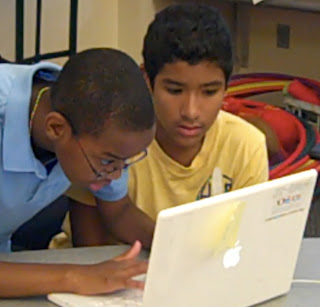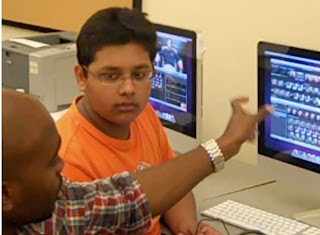Catching up a bit here (so pay no attention to the publication date of the post itself).
On the eighth day, students came to camp prepared to work. They began by finishing off their accounts of the rained out Jackals game (if they had not done that already), then jumped into revising their print features and their video projects.
The print feature had to be done by the end of the day so that all the stories could be collected and formatted as part of an end of camp publication. We asked the students to suggest and vote on titles for the publication. The name receiving the most votes was "The Future Features," with "The Glepic Gazette" a close second. (See a previous post for information about the word 'glepic'). As we do every year, copies of the Future Features will be distributed on the last day to all participants. Previous publications had names like "The Sports Slice" and "The Huddle" (all chosen by the students). For the first few years of the camp we had students work with Publisher to create newspapers on their own, but we found that many groups got caught up with the bells and whistles of the program (adding crossword puzzles, word searches, extraneous photos, etc.) and this distracted from revising their stories. It was hard to take away that hands-on experience from the students, but given the two-week duration of the camp we decided that we needed to prioritize, and more time for revision won out. We have seen features of increasing quality, so it seems like that decision was the right one.
The revision today encompassed everything that we have been talking about - organization, language, and copy editing. Students worked on their own, with teachers,
and in pairs doing peer critiques.
Many of the students slipped into peer critiques quite easily. On the first day of camp we set up group ground rules and these included suggestions about respectful behavior. Some students had a bit of a hard time, taking their peers suggestions quite personally. Because of our low student-staff ratio, teachers were able to step in during these incidents and walk the students through the process. A few times I heard variations on - "He's not saying he doesn't like YOU, he's saying he doesn't really like the way this sentence is written" or "This is only their advice, you don't have to do what they say, and they won't be offended if you don't." Schools also require that students engage in productive peer critiques, so we hope that their Write on Sports experience helps them further develop the skills they need to communicate around writing (and not just through writing).
Students also worked on their video projects.
We gave students a somewhat loose two-minute limit for their video projects. We tried to get them to think about how the average feature on a news broadcast is put together, and stressed that reporters have to work within tight frameworks (for column inches or minutes of screen time). We used iMovie, and as with Publisher in the past, it is very easy for students to get distracted by shiny fonts, funky transitions, and the ability to post snippets of music as a background. Teachers kept going back to students with the same two questions - "What is your story and how does this (video, voice over, title, etc.) help move your story forward?" Students who started with 4 minute drafts and who thought that there was nothing - nothing! - that they could remove were surprised to find that they could get it down to 3 minutes and that the story became sharper. At times there was some significant push and pull around competing visions, just like at a real network. We didn't make students scrub off all of their little flourishes (it still is a summer camp), but most students got the message about staying on topic and working within a time frame.
WOS was founded by Byron Yake, a former sports writer in Pittsburgh for the Associated Press and later Sports Editor of the AP. Inspiration for the project arose from Yake’s interest in journalism, sports writing and education and his desire to help students improve their writing skills. During the summer, Write on Sports runs two-week camps. During the school year, Write on Sports runs afterschool programs and holds special press-conferences. As part of their work, students interview athletes and journalists, observe and write about a minor league baseball game, and write their own stories for print and video production. The camp covers all kinds of sports - from baseball, basketball, hockey and football to soccer, fencing, swimming, curling and any other sport the students might be interested in.
Subscribe to:
Post Comments (Atom)






No comments:
Post a Comment